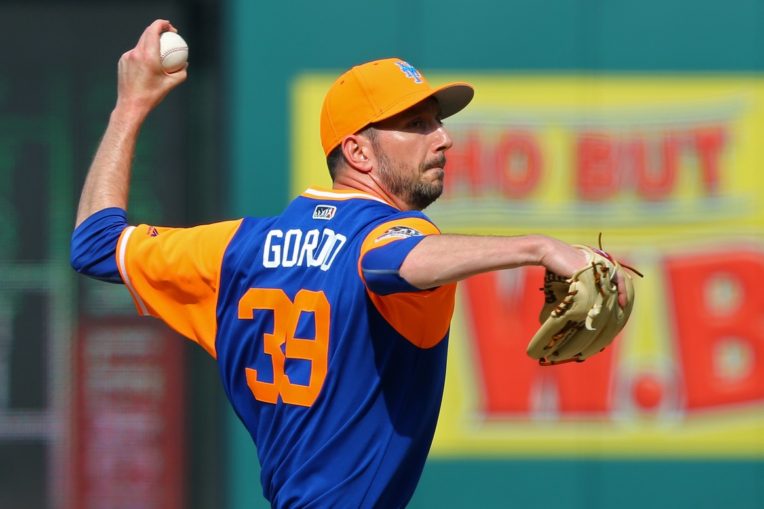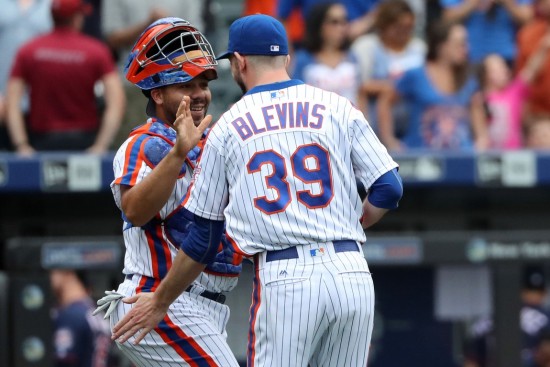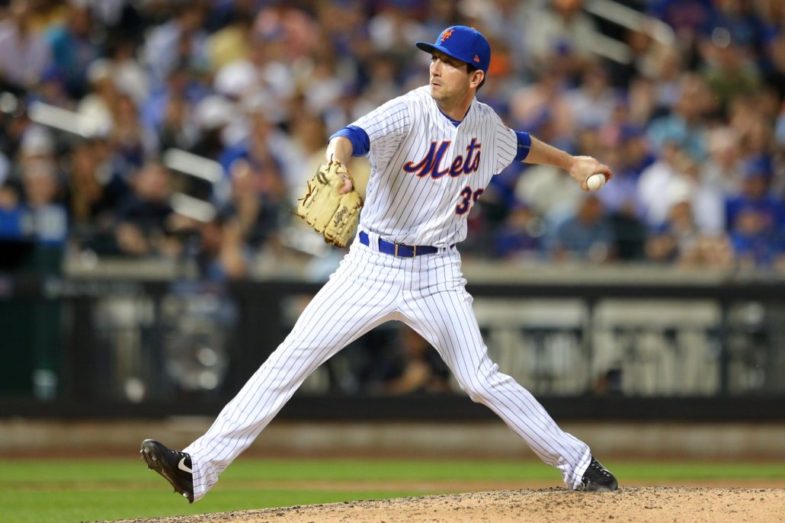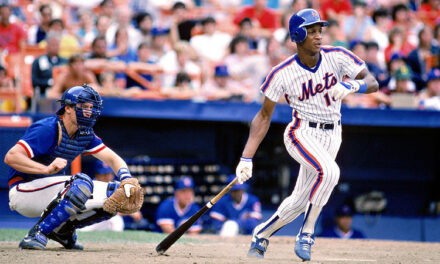
Since 2016, only four relievers have appeared in more games than the 34-year-old lanky left-hander Jerry Blevins.
His 148 appearances are tied with Pittsburgh Pirates’ left-hander Felipe Rivero, and are behind only Addison Reed, Brad Hand, Bryan Shaw and Hector Neris for tops in the majors.
Jerry Blevins is a workhorse.
Acquired by the Mets back in March 2015 from the Washington Nationals for outfielder Matt den Dekker, Blevins has been a steady presence in the back-end of the Mets’ bullpen the last two seasons. He appeared in back-to-back 70 plus games in 2016-17, reaching a career-high in ’17 with 75.
Blevins became just the ninth reliever in Mets history to have back-to-back seasons of at least 70 appearances.
With his heavy workload the last two seasons, it seems like a distant memory when Blevins appeared in just seven games for the Mets in 2015. On April 19, Blevins took a come-backer off the bat of Miami Marlins’ second baseman Dee Gordon to his left forearm. He was removed from the game and was diagnosed with a fractured left forearm.
As Blevins was making progress in his rehab to return for the team’s pennant run, he re-fractured the same bone when he slipped off a curb in early August. His season was officially over with surgery looming, leaving Blevins to watch his teammates work their way to the World Series without him.
When speaking to Blevins about not being able to participate in the World Series with his teammates, it’s evident that he still owns disappointment in not being able to contribute on the field. Especially with three big lefty bats in the Kansas City Royals’ lineup in Alex Gordon, Eric Hosmer and Mike Moustakas, Blevins languished over the fact that he couldn’t offer his abilities to neuter left-handed hitters in the Fall Classic.
The team signed Blevins to a one-year contract following their World Series defeat. With the injury and surgery behind him, Blevins turned in one the finest seasons of his career, appearing in 73 games while posting a 2.79 ERA.
In a year where many of the Mets underachieved, landed on the disabled list, or both, Blevins represented consistency in a topsy-turvy ’17 season. He led all Met pitchers in appearances (75), strikeouts-per-nine (12.67), was 2nd in ERA (2.94), and third in swinging strike percentage (12.8 %) among pitchers with at least 40 innings pitched.
Blevins is now in a wait-and-see mode, hoping the team decides to pick up his ’18 option ($7 million) to return to a club that he describes has a “chip on their shoulder” coming into next year.
I had the pleasure of speaking with Blevins this past week, where we discussed his major league debut with Oakland in 2007, getting traded to the Mets and his thoughts on Terry Collins and Dan Warthen.
MMO: Who were some of your favorite players growing up?
Jerry: Ken Griffey Jr. was my favorite player of all time. Something about that swing, his charisma, being left-handed and watching him swing and throw.
I was a huge fan of Randy Johnson and Greg Maddux; that era of baseball is where I grew up really enjoying the game.
MMO: Did you ever get the chance to face Junior in your career?
Jerry: I did, yeah! I faced him a couple of times.
MMO: And how did you fare against him?
Jerry: The first time I faced him he was with the White Sox and I was still with Oakland. I struck him out to end the inning and I went and sat in the dugout and I kind of got a little overwhelmed with emotion. I ran up to the clubhouse real quick as my manager said I was done. I went to try and gather my thoughts and I grabbed my phone, which is a no-no, and I called my older brother, and he’s crying. He’s like, “I can’t believe you did it!”
It was super emotional for me because it’s something that I grew up facing Ken Griffey Jr. a million times in my head. That’s who I always pretended to face because you always want to face the best. And then I got to do it. It was really cool! It was one of those moments in my career that I’ll never forget.
MMO: At what age did you start pitching?
Jerry: I kind of pitched my whole life. I always had a pretty good arm and being left-handed everybody always pushes you onto the mound.
I really enjoyed playing first base a lot; I did that all the way through high school. Once I got into college, I never really got a chance to play a position, it was always just pitching.
MMO: I read that you attended the University of Dayton on an academic scholarship, and walked onto the baseball team during an open tryout. Was baseball the career you were looking to get into, and if not, what were you hoping to do as a profession?
Jerry: I mean, baseball was always something that I wanted to do. I came from a really small high school in Northwest Ohio, so I never really got recruited anywhere.
I knew I had the skills, I threw about the same as I do now. I threw like 88-90 mph out of high school, a lot of strikeouts and a lot of walks, just really raw but no exposure. I went to Dayton, my best friend and I, [and] I went there for the school. It’s a good school.
We went and we had talked about it before we went there, that if we could try out for the baseball team we both would. One day, we saw that the poster was up in the dorms, it said tryouts this Saturday, show up at 8 AM. We did and I ended up making it and my best friend didn’t, and it kind of went on from there.
MMO: In your junior year at Dayton, you started 13 of the 14 games you pitched. Prior to the draft in ’04, were any teams scouting you as a starter, or were clubs preferring you as a reliever early on?
Jerry: There wasn’t any talk whatsoever about any of it, to be honest. The scout that signed me, he’s still doing it and his name is Brian Williams, that was his first-ever player that he got drafted. He was a young, new scout. All the talk was just kind of speculative, and so I never put too much stock into it, coming out of nowhere.
I never really anticipated getting drafted. Once the buzz came around I was expecting to be drafted in the 40-to-50th round kind of thing. I only anticipated coming back to school and so when I got drafted higher it was kind of a shock to the system, and they offered me enough that would’ve paid for my last year of college and I had to take it.
MMO: What are your memories from your MLB debut back on September 16, 2007, with Oakland?
Jerry: It was a pretty big debut; there was a lot going on. First of all, I remember I had a locker right next to Nick Swisher. I’m from Ohio, he went to Ohio State. He’s a big personality; a big, fun guy so he was so welcoming. He made you feel a part of the team right away.
Being in Oakland, it was a really small clubhouse, so I shared my big league locker with Jack Hannahan. We would have to take turns getting dressed for the game.
I remember on my debut it was my second day in the big leagues and Swisher was hit by a pitch from Vicente Padilla. He charged the mound and I just remember running out onto the field because I had just gotten traded over about two months prior from the Cubs to the A’s. I knew no one in the big leagues because I had never been in big league camp with these guys.
I remember knowing more guys on their team with the Rangers than I did on our own team. So I just ran over and I was like, ‘Man, this is crazy. The big leagues’ is nuts!’
Guys throwing punches and so I grabbed one of my friends I knew on the other side and I just held on and was like, ‘Don’t punch me and I won’t punch you.’ [Laughs.]
MMO: Wow! That’s some debut when you’re already amped up for your first-ever appearance in the majors, only to be involved in a benches-clearing brawl!
Jerry: Yeah, a lot of action. I wanted to make sure I didn’t hit anybody and get thrown out my first day!

MMO: What were your initial reactions when you learned you were traded in March 2015 to the New York Mets from Washington?
Jerry: It kind of caught me off-guard; it was really late in spring. I knew we had a competitive team in Washington and I felt like I was a good part of that. I was a little bit surprised that I got traded. There was some speculation going around but I try not to pay attention to anything. I just try to keep my head down and do my job.
When I got traded over, I knew it was a little bit of shock and that I was excited. The team obviously wanted me here in New York and it looked like the Nationals didn’t want me anymore. You go from a situation where you’re unwanted to being wanted is kind of nice for your ego as well as for your career.
I knew this team was really young and really talented. I felt like they were a year or two away from competing. Boy, was I ever wrong! That year I ended up getting hurt but that was the year we went to the World Series.
MMO: Speaking of your injury, that 2015 season was tough for you personally. Fracturing your left forearm in April that year, and then again in a freak accident in August. How tough was it for you to watch your teammates from the sidelines? What did you do to stay motivated and positive throughout that trying time?
Jerry: That was, like you said, a really difficult time for me personally. I was really excited and it’s always mixed emotions of watching your team do well and make it to the World Series. At the same time, that’s something that you dream about your whole life. You dream about pitching in the World Series. It was rough knowing that you’re not a part of that when your teammates are.
It’s also very heart-wrenching and a gut check. It was mixed emotions of me being pumped for my teammates and really cheering everyone on and being excited, but at the same time, trying to wash away that melancholy of not being a part of it.
Overall, it was a great experience. At the same time, you have a little bit of doubt of you not being there, especially when you see an obvious need of your team that needed what you could bring to the table.
MMO: How and when did the “Hello Jerry” segments begin?
Jerry: I’ve got a pretty decent relationship with the media. I respect what they do, especially in New York. I know what makes a lot of this organization go round has a lot to do with the media, so I respect what these guys do and a lot of them are there with us every day.
Steve Gelbs is a guy that’s around with SNY all the time, and we were just chatting. I had mentioned to him that I had done some stuff with the A’s on the West Coast, we did some TV stuff with Comcast and we had some fun doing some segments. So I said, ‘If you ever have any ideas if your producers want to do something.’
Then we kind of came up with the idea of “Hello Jerry” and it’s kind of evolved from there.
We have fun with it, it’s a little bit difficult to do. I’ve learned that if we lose, it is impossible to ask Twitter for questions for “Hello Jerry” because everyone gets mad at me that I should be focusing on a team loss as opposed to having a little bit of fun on TV. So you live and you learn. You know when to push the right buttons and what not to do.
MMO: You’re very involved on Twitter and social media. How important is that aspect to you in regards to interacting with fans?
Jerry: I enjoy it. It’s a way to show my personality and just kind of be a regular person. I try not to speak about baseball at all on Twitter, I try to avoid most of that. The Player’s Association, our union, came up with a new app called Infield Chatter. It’s just kind of coming into its own. I’ve kind of used that for strictly baseball purposes and learning that new platform and I try to just only speak baseball there.
But on Twitter, I try to avoid baseball for the most part. I try to avoid politics as much as I can and I try not to be too polarizing one way or the other. I just want to show that we’re human beings too, and show a little bit of my sense of humor and have fun with it.
MMO: I haven’t heard of Infield Chatter, sounds like a great idea though. You mentioned that it’s fairly new?
Jerry: Yeah, so it’s pretty much this year. You can download the app and a lot of players are using it and speak about baseball and that stuff. It’s in its infancy and it’s kind of coming around. It’s another social media platform and basically access to all the players. And like I said earlier, we’re kind of figuring out how to use it properly and what we can do with it. But I avoid baseball for obvious reasons on other platforms, but for here, I’ll be able to speak on it.
MMO: Over the past two seasons, you’ve appeared in 148 games. How do you physically and mentally prepare for each game, knowing there’s a good chance you’ll make an appearance?
Jerry: Especially as I get older you realize that there are certain things that you have to do and there are a lot of things that you can’t do anymore that you could do in your early twenties. Like going out and having a couple of drinks and having a night out.[Laughs.] I’ve learned quickly that my body, not only is it not fun for me personally anymore, but my body doesn’t bounce back.
You sacrifice some things, you make sure you get a good night’s sleep, that you’re eating proper meals. But mostly, it’s preparation at the field. Whether it’s how I roll out and I do my stretching and my preparation, a majority is being at the field and I get to take care of it.

MMO: Obviously, the news came out over the last few weeks that Terry Collins and Dan Warthen won’t be back in their respective roles. Can you talk a little about each, and what they meant for you in your time here in New York?
Jerry: I’m glad Terry’s going to stick around with the Mets, that’s a good fit. Obviously, he’s had success with the organization, I think he had the most games managed as a Mets manager. That’s a big deal. And for him to stick around I think that’s the right thing to do. I understand the move; business is business. I’m excited to see what type of changes they’re making to try to make the team better personnel-wise.
As far as Dan goes, I had more of a personal relationship with Dan. Obviously being a pitcher, we interact more often. It’s sad to see him go. I think he was really talented, not just because I’ve been around him and we’ve had a good relationship personally, but because I think he’s really good at what he does. He’s very analytical but he’s also knowledgeable in the old school, the way he’d prepare me with the scouting reports and that kind of stuff. It was very individualized where I kind of knew the approach I needed to take for each individual hitter.
I wish them both luck, I hope to see them soon. I’ll miss them next year, depending on where I’m at and where they’re at. But I appreciated what they had done for my career.
MMO: You have an option with the team next year. Are you hoping they pick it up and you’re back with this club? Do you think the team is close to competing again?
Jerry: I absolutely hope they pick it up, I would love to come back to New York. I feel like we have a lot to prove, and I think we’ll play that underdog role a lot better than we do playing the favorites. Everybody kind of needs a chip on their shoulder. We had such a young team in the rotation and seeing some guys go down, some of our position players getting hurt, overall a little bit of underperformance, it bears on you and you learn and you grow from that.
You become either a better person or a bitter person, and I think I’ve seen a lot of guys become better. I’m excited for next year for the Mets and I hope to be a part of it.
MMO: I think the pen can be a major strength for you guys, especially with a full season of Jeurys Familia and A.J. Ramos. It would be great if the front office can add one or two more back-end arms though.
Jerry: Yeah, I think we have a lot of really good parts. I think, as you said, need one more solid back-end arm, which is always welcome. I’d like to see them maybe go out and sign [Addison] Reed back, but that’s me personally. I just like having him down there. He’s a friend of mine and my wife and his wife are friends. He’s a great pitcher too, but it should be interesting.
I know there’s a lot of talk of our rotation next year, with the amount of innings they didn’t throw last year, so there’s going to be the possibility of limits. We’re going to need some steady, solid arms in the bullpen next year.
MMO: Building bullpens seem to be the biggest trend in recent years and the specialization of relievers seems to be taking on new heights.
Jerry: The way they’re using the bullpens nowadays, I think a lot of people underestimate what the bullpen does. I think baseball’s coming around to understand that there’s a lot of talent in the bullpen, and that a third time through the lineup for a starter unless he’s your one-two guy, there’s some middle relievers who can really pitch and so you’re seeing them get more innings more often.
MMO: I’m always curious as to what you guys talk about in the bullpen during the game, anything you can share?
Jerry: Oh, we talk about everything! From politics to gun control to religion to silly things like TV and movies.
Kevin McGowan came up in September, and he’s a huge horror film ‘80s buff, and so he and I talked a lot about movies constantly.
In our scouting reports, I don’t know if you saw all the iPads that go into the dugout and in the bullpen, they have these huge iPads, and our people write up our scouting reports and put certain things in there. We made a request to put in riddles, like three riddles every day for us.
The first couple of innings we’re going over the scouting reports and looking at their lineup, but there’s also a couple of riddles that guys are trying to figure out and we usually give it to the fourth inning and then we kind of stop thinking about it. We try to exercise our brains too and keep us occupied down there.
MMO: Speaking of movies, I know from following you on Twitter that you’re a big film buff. Do you have a top-3?
Jerry: Oh man, that’s a lot of pressure. Top three? You can’t do that to a guy! I can give you my favorite movie of all time: Shawshank Redemption. I can give you my favorite comedy: Tommy Boy. I guess my favorite movie from last year was Arrival. I really enjoyed it; it was like a unique take on a sci-fi movie. It was really, really good, I saw it a few times.
MMO: What’s a normal off-season like for you?
Jerry: I kind of throw early. After Thanksgiving is when I start playing catch pretty regularly. Then into December, I’ll start to throw a little bit more intense, and then in January I start throwing bullpens.
I don’t like to take too much time off; I might even start tossing once every couple of days before Thanksgiving. I really, really pick it up right after Thanksgiving. I just don’t like the lag in time, plus playing catch is fun and it’s easy to do so I enjoy that.
MMO: Thank you so much for some time today, Jerry. It was a pleasure speaking with you. I hope to see the team pick up your option for next season!
Jerry: Thanks, Mathew. I’m glad it worked out!
Follow Jerry Blevins on Twitter, @jerryblevins















